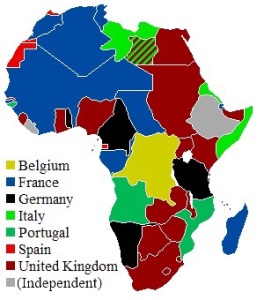
Humanity has long been obsessed with empire-building. From the ancient Mesopotamian kingdoms to Rome to the dominions of Great Britain, man’s ambition to control vast swaths of territory has seemed so strong that it can not be conquered. Since the 15th Century, when Western European navigators and adventurers began to set sail to chart mysterious lands, Western civilization became swept up in the maelstrom of colonization. This frenzy continued throughout the “Age of Exploration” and into the 18th and 19th centuries.
At first, European nations like Britain, France and Portugal were content with establishing trading posts and commercial ports in Africa and Asia. But as technology developed and the need for more substantial raw materials grew with it, the Europeans found themselves pushing deeper into the continent of Africa. David Livingstone travelled the Nile River in search of the heart of Africa. His adventures opened the door for the African heartland to be explored and colonized.
This opening of the African interior sparked a desperate race to colonize the continent which became known, appropriately, as the “Scramble for Africa”. During this period, France and Great Britain emerged as the dominant powers on the African continent. The British claimed most of southern Africa, while the French built up an empire in northern and West Africa. Portugal, Germany, Italy and even tiny Belgium cut their own pieces of the pie. By 1914, the entire African continent was controlled by Europeans with two important exceptions: Liberia, a free republic which was formerly an American colony for freed slaves, and Abyssinia (Ethiopia), which had fought off invasions from the Italians and would remain free and independent until Italy finally defeated it on the eve of a World War II.
The African empires of the great European powers were extensions of the countries and their interests. Sometimes, the European states seemed to be at the brink of war over the borders of the African possessions. Incidents, like the one between the British and French at Fashoda, Sudan in 1898 and the French and Germans in Morocco in 1911, dragged the imperial powers dangerously close to open conflict. During World War I, Africa was embattled by enemy armies. By the end of the First World War, Germany had been forced to give up her overseas colonies and this left France and Great Britain in a position of uncontested dominance in Africa.
The dust of the Scramble had not even settled before the African people began seeking independence in earnest. After World War II, the process of Decolonization (as much a whirlwind as colonization had been) began. But European cultural and political norms had been imposed on Africa and rather than returning to the sustainable and century-tested tribal system, Africans tried their hand at Western-style governments and economies with disastrous results. Poverty persisted, corruption reigned and anarchy and rebellion were commonplace. Strife between ethnic groups and rival tribes reached genocidal levels. The power vacuum created by the sudden withdrawal of the Europeans created a tragic opportunity for exploitation and tyranny.
